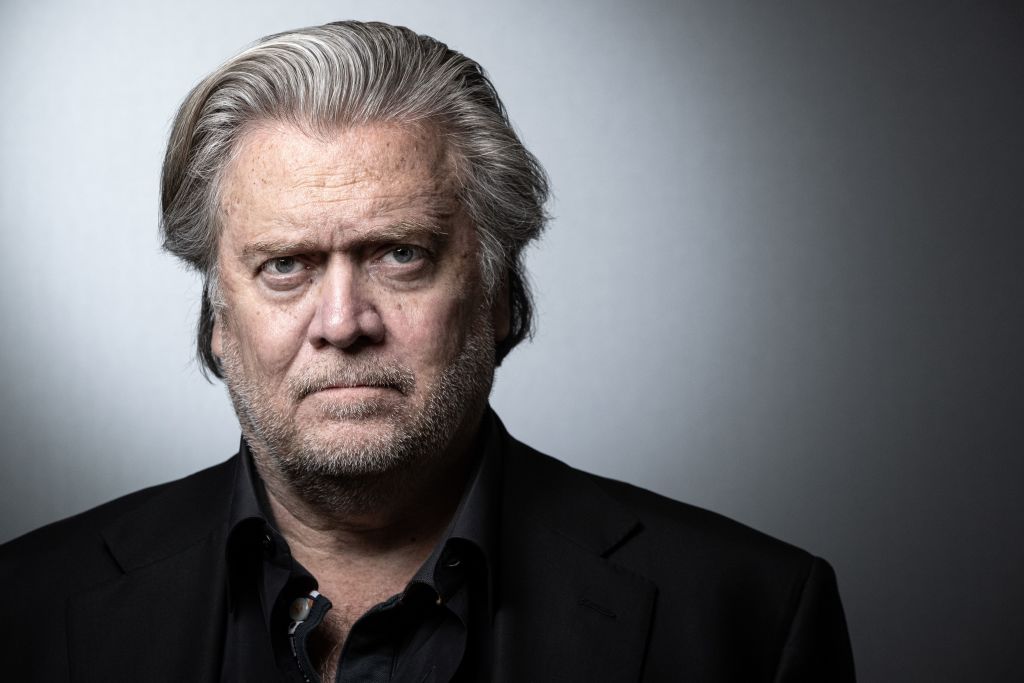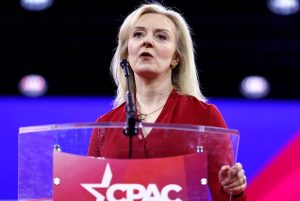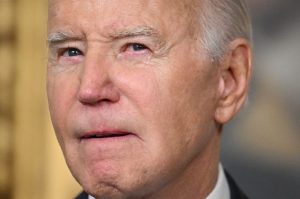Until recently, it seemed unlikely that Donald Trump would need to call on the services of his former strategist Steve Bannon ever again. Why would he need a fire-spewing insurgent like Bannon, given that he was governing from a position of strength? The economy was at Mach 8; unemployment was at record lows; Kanye West was a personal friend. Above all, this presidency was good television. Viewers would want to find out what happened next.
Now refrigerated corpse trucks rumble through the streets of New York City. The number of unemployed threatens to raise John Steinbeck from his tomb to write realistic novels about down-and-out gig workers. ‘We are living in a failed state,’ lamented an uber-viral George Packer article a few weeks ago. Whether or not this is true is debatable, but the fact that the piece was gleefully picked up by Chinese state media shows that for Trump, this moment is as humiliating as it is tragic. The vaudeville President is no longer reliable entertainment. When he angrily stalked out of a press conference last week, he looked like he might walk all the way back to Trump Tower.
Trump is losing, and he knows it. External and internal polling shows that his position is bad. ‘The swing state polls are horrific,’ one insider told Vanity Fair. In 50 of the most recent polls Trump only led Joe Biden once. He’s about to be undone by a guy who cannot safely leave his basement and a colony of sneezing cave bats. You would not bet on campaign manager Brad Parscale making it to the end of June at this rate. Who could replace him?
Narratively — and the Trump presidency is best understood as a fantastical narrative, a movie, a show, or a rich person’s preposterously extended Instagram story — the only answer that makes sense is Steve Bannon. In the extended Trump Cinematic Universe Bannon has occupied a special zone. He read books. He possessed an ideology, even if it was a bit extreme. Uniquely for Trumpland, he did not appear to be purely a grifter. Bannon injected dark substance into flashy Trumpian style, which is not something The Mooch was ever going to do. After the campaign was won Bannon became box office in his own right. Simultaneously repulsed and attracted, journalists painted a portrait of him that was a cross between Joseph Goebbels and one of the nastier iterations of Godzilla. But there was only room for one king of the monsters in the West Wing. ‘Trump doesn’t want any co-stars,’ admitted Bannon as he received the full excommunication treatment in 2017.
Since then Bannon has gallantly romped from entertaining failure to ambivalent misfire, laying waste to his reputation for strategic acumen in the process. When Roy Moore exploded in Alabama and he lost control of Breitbart, Bannon set himself up as the ne plus ultra of populist ideologues. He was a counter-revolutionary St Paul, the digital Tom Paine of the 2010s. Criss-crossing the world by private jet, trailed by documentary crews and shielded by bodyguards, Bannon launched a maverick one-man jihad to slay the globalist dragon.
Bannon went deep inside the whale. There he was being interviewed by Lionel Barber at the Financial Times’s ‘Future of News’ conference. Here he was being interrogated by Zanny Minton Beddoes at the Economist’s ‘#OpenFutures Festival’. Then the Munk Debate in Toronto, where Bannon torched a useless David Frum, followed up with a freewheeling Q&A inside the crenellated hall of the Oxford Union. When you watch these events now, it is clear that Bannon relished them in a way his interlocutors did not. Bannon’s charismatic Middle American loquacity made them look stiff and mechanical, like Pez Dispensers stocked with dull platitudes.
Alongside the cream (thick and rich) of Anglo-American journalism, Bannon wasn’t out of place. In a way this was part of the problem. He looked like a circus act, entering elite arenas to be hooted, snarled and sneered at. Although there was some propaganda value in these endless rounds of interviews, the political value of them for the ‘global populist movement’ was harder to ascertain.
Last year, Bannon’s attempt to boost a wave of right-wing politicians in the European parliamentary elections produced a scrawny harvest. In Germany, AfD representatives said they wouldn’t work with him because he didn’t understand Europe. Marine Le Pen said Bannon was limited in what he could do because he ‘isn’t from a European country’. Matteo Salvini told Politico that Bannon ‘wasn’t on the radar’. Who would have thought that making a continent-spanning coalition of rigidly parochial parties would prove difficult for an outsider? Bannon’s plans to open a ‘modern gladiator school’ to train a future populist cognoscenti in a Bond-villain location in Italy flamed up Hindenburg-style too. Like Vladimir Lenin, Bannon was much better at starting a revolution in his homeland than in Europe.
Paradoxically, the people left speaking to Bannon most in this period were the liberal journalists who despised him. There was a danger that Bannon would end up like the Howard Beale character in Network (1976). He’d be wheeled into TV studios to jabber about borders, but safely defanged and declawed, another flayed pangolin in the global wet market of ideas.
Why then, would the President pick up the phone to a guy who can barely get a meeting with Matteo Salvini? Bannon’s ill-starred eurotrip doesn’t obscure the fact that he has a better feel for campaigns than anyone currently on Trump’s staff. It’s worth recalling how low the Trump campaign was in August 2016 when Bannon took over.
Trump was behind Clinton across the board, and in swing states like Pennsylvania and Florida she enjoyed a double digit lead. Fiasco after fiasco — fights with war veteran’s families, fights the Pope, claims that Barack Obama ‘founded Isis’ — left Trump facing a devastating defeat. While Bannon let it be known that he was encouraging ‘Trump to be Trump’, he actually had him read off a teleprompter. It was Bannon who had the vision to see that Clinton’s blue wall was another Maginot Line. The newly disciplined candidate began an improbable polling rise. According to Rolling Stone’s Matt Taibbi, ‘the campaign really turned when Bannon came aboard’. After the Access Hollywood tape, it was Bannon who went on the attack. ‘Trump’, wrote Joshua Green in 2017, ‘wouldn’t be president if it weren’t for Bannon’. Green was right.
***
Get three months of The Spectator for just $9.99 — plus a Spectator Parker pen
***
After all his travails, Bannon has enjoyed something of a renaissance recently. He was banging the COVID-19 drum long before any other comparable public figure. His instincts on China — whose government two-thirds of all Americans blame for the crisis — are in accord with the electorate. He has found, with his very popular new radio show and podcast War Room: Pandemic, a new audience.
More Americans than ever are thinking about China in Bannonite terms. Nearly three-quarters of Americans want the relationship with China to change, and a large majority want to end dependence on Chinese manufacturing for key goods like medical supplies. It is an understatement to say that Bannon would know what to do with these burgeoning sentiments.
Ultimately, elections are about assigning blame. There is an awful lot of blame to go around in 2020. China or Trump? The President loves a comeback — he may need to engineer Bannon’s in order to facilitate his own in November.


















